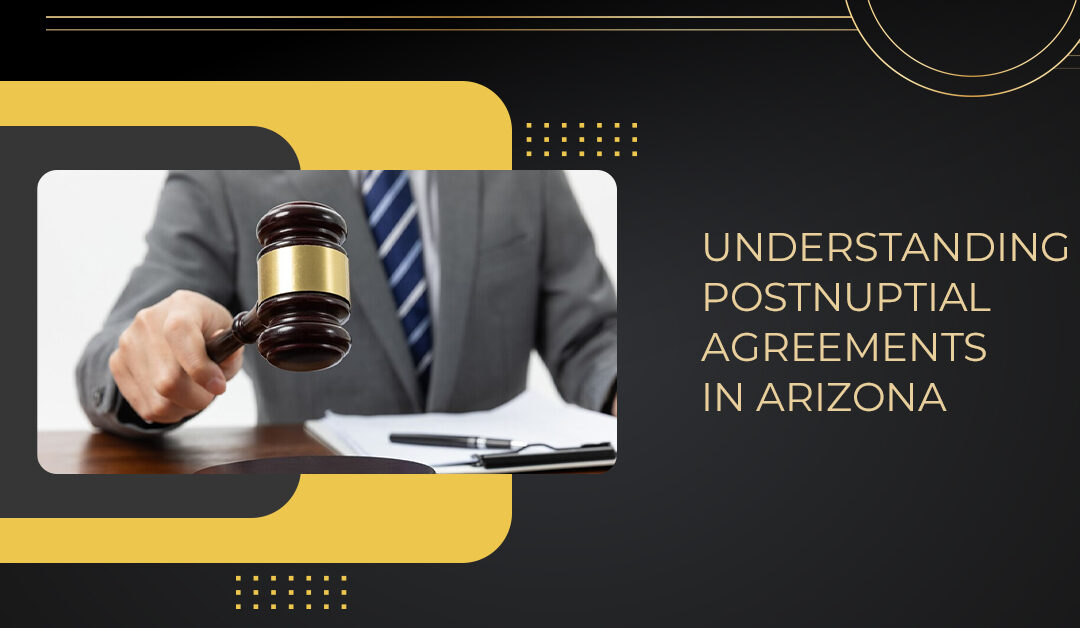Most people enter into marriage with the hopes that it is going to last. However, not every union is the same, and more often than not, a good marriage can end up in a divorce. With the rates of divorce being on the rise, signing a postnuptial agreement is becoming popular among married couples. Let’s have a look at what a postnuptial agreement is and whether you need one.
What Is a Postnuptial Agreement?
Marriage is a legal union of two individuals that is recognized by the law. Entering into this union allows spouses to share their assets. While the sharing of assets is a non-issue in a stable marriage, getting a divorce can get things complicated. One of the contentious issues during divorce proceedings is dividing assets. The discussion around money, properties, and other assets can see both sides fighting for what they believe they deserve. This is where the postnuptial agreement becomes useful. A detailed postnuptial agreement in Arizona is a legal contract created by a married couple after their wedding, which outlines how their assets and finances will be divided in the event of a separation or divorce. It may also detail how matters related to the marriage can be dealt with, making the divorce process simpler and faster.
How Does a Postnuptial Agreement Differ from a Prenuptial Agreement?
The difference between a postnuptial agreement and a prenuptial is the timing. While prenuptial agreements are signed before entering into a marriage, postnuptial pacts are made after the ceremony. A prenuptial agreement requires the two parties to have different attorneys, but they can use the same attorney when putting together a postnuptial pact. However, prenuptial agreements are more common among couples than postnuptial agreements.
What Are the Details Included in Postnuptial Agreements?
A postnuptial agreement must clearly outline how you and your spouse want to handle issues in case of a divorce. This is not limited to asset division, but also other issues that may affect your marriage. Here is a brief breakdown:
Terms of Asset Division
The most important details in a postnuptial agreement are asset division. You need to be as specific as possible, providing details about how money and assets are to be divided between the two of you.
Handling of Debt
A couple may take out loans to buy a new home or start a new business, or may have accumulated credit card debt throughout the marriage. A postnuptial agreement details how they will handle those debts after a divorce. This includes who will be responsible for which loan or how the payments will be made.
Transfer of Assets if One Party Dies
Although not a pleasant topic to talk about, unexpected deaths happen all the time. Acknowledging this in your postnuptial agreement makes it clear how the assets and liabilities will be shared.
Terms of Spousal Support
One side may want the other party to pay X amount, while the other may say that the amount requested is too high. Specifying how to approach spousal support in the postnuptial agreement helps prevent things from heading the wrong way.
Can the Terms of Custody and Child Support Be Included in the Postnuptial Agreement?
While custody and child support are points of concern during a divorce, these topics may not always be addressed in a postnuptial agreement. In many cases, the agreement does not enforce the terms of custody and child support. Since the courts focus on the best interests of the children, they will evaluate the specific situation of a divorce first to decide about custody and child support. This means that the courts can still get involved on behalf of the children, regardless of how a couple has laid things out in the agreement.
How Can Both Sides Ensure That a Postnuptial Agreement Is Valid?
After mutually drafting a postnuptial agreement, the couple must cooperate to ensure that it will hold up in a court of law. Both parties must independently seek legal advice and fully disclose their financial information. They will then sign the agreement voluntarily after fully understanding its terms.
How the Two Parties Are Involved
The parties involved in signing a postnuptial agreement must voluntarily agree to the provisions of the agreement. If the court finds that one party was not given ample time to review the agreement or was forced to sign, the agreement may be invalidated.
When The Postnuptial Agreement Is Not in Writing
When it comes to legal matters, it’s always important to get things in writing. Placing that document in front of the judge to examine increases the chances they will honor it during the divorce. If you enter into a postnuptial agreement and do not have it in writing, it may not be enforced by the courts.
The Postnuptial Agreement Lacks Accurate Details
Just like a verbal agreement, inaccurate information will not hold up in court. Check all the details and facts to make sure everything is presented accurately.
The Postnuptial Agreement Contains Invalid or Unreasonable Provisions
When crafting the postnuptial agreement, the outlined provisions must be valid and reasonable. First, the postnuptial agreement must be cognizant of the laws in the area for the court to acknowledge it. Second, the agreement must be fair and not favor one side at the expense of the other. You will have higher chances of the court accepting the agreement when both sides are getting a fair share.
When Should You Consider Creating a Postnuptial Agreement?
Although bringing up the topic of a prenuptial agreement to your spouse can raise questions, several reasons may make it necessary to create one:
You Want to Ensure Your Children Receive a Fair Share of Your Assets
Whether you want to protect children in your current or earlier marriage, creating a postnuptial agreement can be an effective way of ensuring their future is safe. It will indicate how you want your assets distributed so that your spouse and your children receive a fair amount.
You Want to Protect Your Assets
You may want to keep the assets you had before marriage separate, or any business ventures that you started on your own. A postnuptial agreement could prevent the divorce from being messier by highlighting which assets you wish to retain.
You Suddenly Received a Large Inheritance
You may consider creating a postnuptial agreement if you recently received a large inheritance. Without a postnuptial agreement, the inheritance will be treated as another one of your joint assets. In case of a divorce, the inheritance will be divided equally alongside other mutually owned properties.
You Did Not Want to Deal with Creating a Prenuptial Agreement
Planning a wedding can be stressful, and creating a prenuptial agreement may be the last thing you want. After the wedding, when things have cooled down, you can create a postnuptial agreement with your spouse detailing how you want to handle the marriage and your assets.
You Want to Secure Your Assets while Giving Your Marriage Another Try
Some couples sign a postnuptial agreement ahead of one more reconciliation attempt at their marriage. As they are trying to save their marriage, they also acknowledge that divorce is a real possibility. If the reconciliation attempt does not work out, the agreement will help speed up the divorce proceedings.
Get Legal Assistance for Your Postnuptial Agreement
Your postnuptial agreement needs to be well articulated and detailed. If you’re unsure about your approach or what you need, contact us at the Schill Law Group. Our experienced lawyers will guide you on creating a postnuptial agreement and any other legal matters arising in your marriage.



